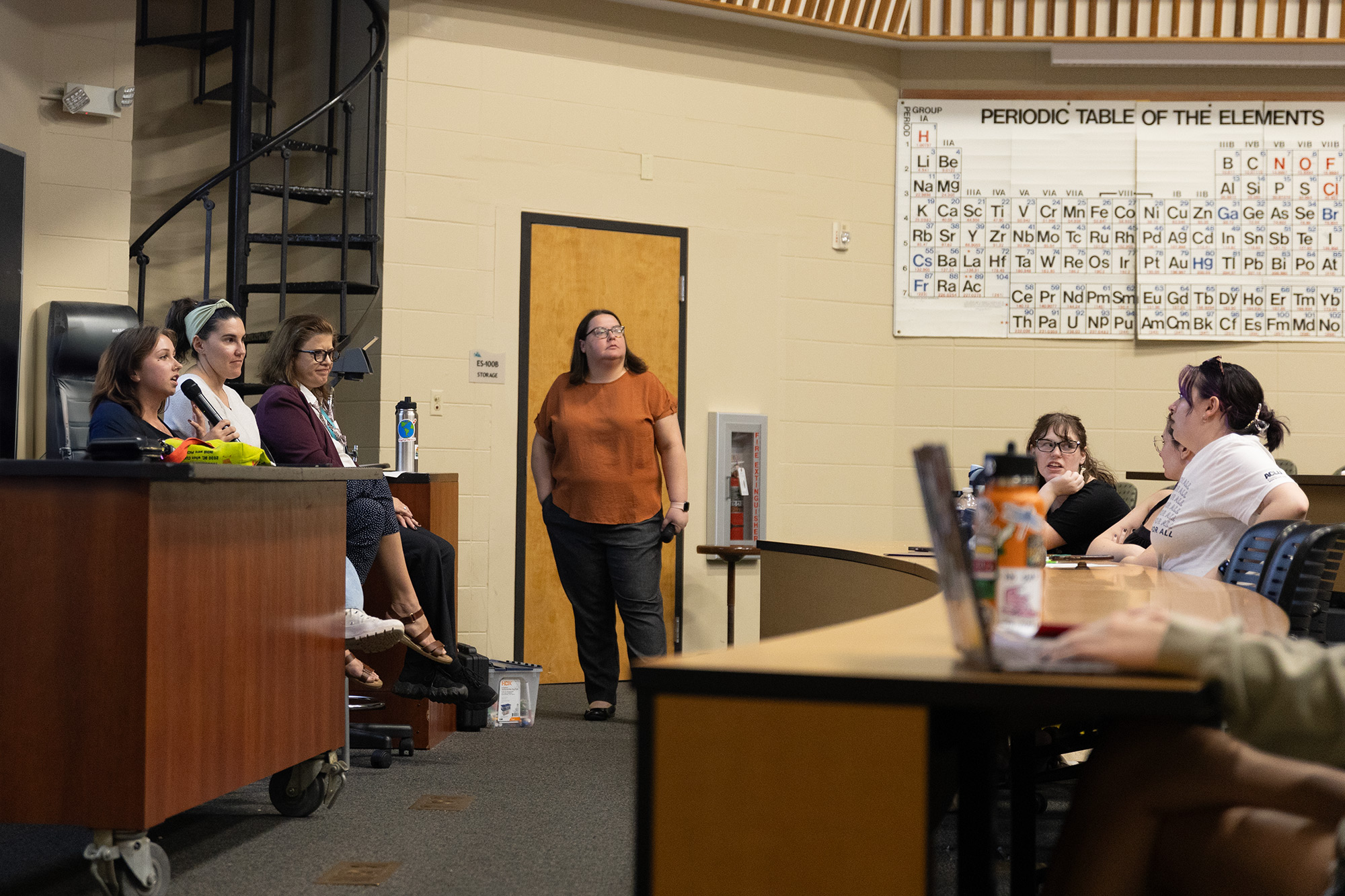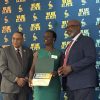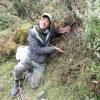“If you’re a human on this planet, public health matters,” says Eckerd College Associate Professor of Biology Denise Flaherty, Ph.D.
There are several reasons for students to pursue Eckerd’s new public health minor, which was elaborated on at Eckerd’s information session, panel discussion and Q&A on Nov. 13. The Environmental Studies room in the Sheen Center was filled with students eager to learn about the minor first introduced this year.
Panelists at “Why Public Health Now? An Exploration of Eckerd’s Newest Minor” included Flaherty; Assistant Professor of Psychology Sarah Lyle, Ph.D.; and Nadia Plechaty, a senior from Littleton, Colorado, who is the first to minor in Eckerd’s new subject. Nadia’s academic mentor, Associate Professor of Sociology Lisa Miller, Ph.D., moderated the event.
Eckerd’s public health minor was created due to students’ interest in health-related courses, healthcare careers and Master of Public Health programs—as well as faculty interest in better preparing students for said career paths, Miller says, who serves as the primary discipline coordinator for the minor.
“Overall employment in healthcare is projected to grow much faster than the average for all occupations from 2023 to 2033,” according to the U.S. Bureau of Labor Statistics, with about 1.9 million projected openings per year.
Eckerd’s program “offers a new and exciting opportunity for students to gain interdisciplinary training, data literacy skills and the cultural competencies needed to provide higher-quality medical care and health-related services to diverse populations,” Miller says.
“Eckerd also presents unique global health opportunities,” she adds, “as we are in the process of building study abroad courses on health-related topics.”
Because of the minor’s interdisciplinary nature, students across majors and interests may find the program to be the right fit. They must complete five courses, including the required Foundations of Public Health, to complete the minor. They also must take a statistics course and three electives across varying disciplines—with options such as Public Policymaking in America, Health Psychology, Neuroscience, and Science Communication.
The program is designed to provide students with a preprofessional background that will support careers in public health, medicine, healthcare administration and health education.
Nadia, who will graduate with a Bachelor of Arts in sociology and a public health minor, says, “As soon as I started learning about the social determinants of health, a lightbulb just kind of went off.”
She is intrigued by health disparities caused by social inequality, and the courses she took at Eckerd prepared her for her study abroad experience in Ghana, she says.
Nadia completed an internship with the West Africa AIDS Foundation, a nonprofit working to limit barriers for sexual health in Ghana, because there is social inequality and a stigma around sexuality, she says. What she had learned from her courses aided in her ability to help create solutions, she adds.
There are threats to everyone’s health—environmental impacts, policy deficiencies and social inequality—driving Nadia’s passion to understand why they are happening and her urge to find solutions at the community level.
Not only does she value these experiences in an academic and professional way, but she says, “This makes you a better citizen of the world.”
For students interested in learning more about the psychological, biological and social factors in public health issues, this minor is tailored to them.
Some prospective program participants are intrigued by the environmental aspect of health, like sophomore Hailey Hill, an environmental studies and animal studies student from Worcester, Massachusetts. Hailey would like to pursue environmental conservation in the future and has an interest in animal health and policy.
“I came to the event because I think that public health is interesting in the form of my environmental major,” she says.
She plans to look further into the minor because of the Environmental Health and Science Communication courses. She doesn’t have much experience in those fields, she says, and would like to learn about them.
“You don’t have to be an aspiring physician or nurse to want to work with population-level health issues,” Miller says, adding that there’s room for students with broad interests and that medicine and health is a fast-growing labor market.
From a wide range of courses, to connecting students with local internships, Eckerd is working to foster a healthier world through education, communication, policy and prevention.
“My guess is that you are hoping those tuition dollars pay off,” Miller adds, “so this is a professional career path that you can pursue with the hopes of not only lifelong joy but also, hopefully, some economic prosperity and job stability.”














